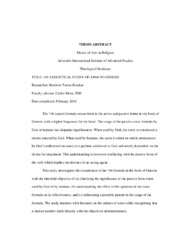| dc.description.abstract | The ארר (curse) formula occurs both in the active and passive forms in the book of Genesis with a higher frequency for the latter. The usage of the passive curse formula by God or humans has disparate significances. When used by God, the curse is considered a decree enacted by God. When used by humans, the curse is either an oracle pronounced by God’s authorized emissary or a petition addressed to God and utterly dependent on the divine for enactment. This understanding is however conflicting with the passive form of the verb which implies the absence of an acting agent.
This study investigates the occurrences of the ארר formula in the book of Genesis with the threefold objective of (a) clarifying the significance of the passive form when used by God or by humans, (b) understanding the effect of the speakers of the curse formula on its effectiveness, and (c) delineating a possible pattern in the usage of the formula. The study interacts with literature on the subject of curse while recognizing that a limited number deals directly with the objectives aforementioned.
The conclusions reached indicate that the usage of the passive form is a grammatical endeavor to focus on the result of an action and less on its agency. The passive form also conveys the idea that a curse formula is an expression of a change of state attained by an offender of direct divine command. The conclusions also point out that while God can both be the Actor and Herald of a curse, humans can only announce a curse. Further, the effectiveness of a curse is expressed through the punishment attached to it and is linked to the status of the speaker and the gravity of the offense perpetrated. Lastly, a pattern of formulation is delineated whereby the ארר (curse) formula exhibits three sections: the cause, the curse, and the punishment. | en_US |

